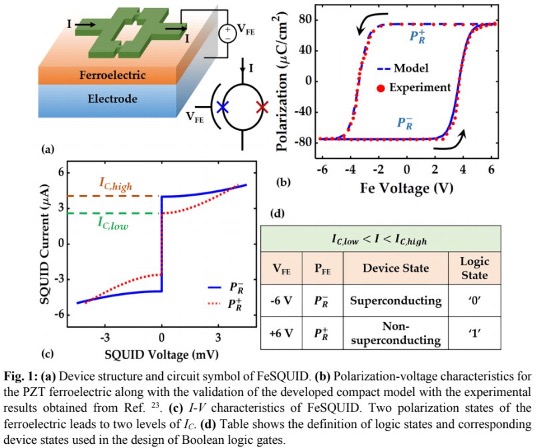Voltage-Controlled Boolean Logic Circuit Based on Ferroelectric SQUID
The Problem
Superconducting devices have been introduced for cryogenic logic gates to fit the increased demand in quantum computing and space exploration. Introducing voltage gating to these devices has been difficult, and these devices cannot be used like semiconducting transistors to design logic gates.
The Solution
Researchers at the University of Tennessee have designed unique voltage-controlled Boolean logic gates utilizing ferroelectric SQUID (FeSQUID). The FeSQUID-based memory technology enables the implementation of an entire system using the same device and will ensure minimum mismatch between logic and memory in terms of speed, power consumption, and fabrication process. This technology has a revolutionary potential within the field of quantum computing and supercomputing electronics.

Benefits
| Benefit |
|---|
| Allows for smaller physical distance between components for improved computing power, weight reduction, and space saving. |
| Combined memory technology that can operate under 4 Kelvin, allowing for use in space tech, quantum computing and superconducting electronic platforms. |
| Scalable technology. |
More Information
- Gregory Sechrist, JD
- Technology Manager, Multi Campus Office
- 865-974-1882 | gsechris@tennessee.edu
- UTRF Reference ID: 23036
- Patent Status: Patent Pending

Innovators
Ahmedullah Aziz

Assistant Professor, Department of Electrical Engineering and Computer Science, UT Knoxville
Dr. Ahmedullah Aziz explores device-circuit-system co-design techniques with an emphasis on emerging technologies. He has received multiple awards and accolades for his research and has published over 80 scientific articles in this space.
Read more about Ahmedullah AzizShamiul Alam

Graduate Research Assistant, Department of Electrical Engineering and Computer Science, UT Knoxville
Shamiul Alam is a graduate student in the Department of Electrical Engineering and Computer Science at UT Knoxville. His research focuses on device modeling, circuit design, emerging memory devices, cryogenic logic and memory, and in-memory computing architecture. He has received the University of Tennessee's TOP100 Graduate fellowship, and the GATE Fellowship from Science Alliance.
Read more about Shamiul Alam